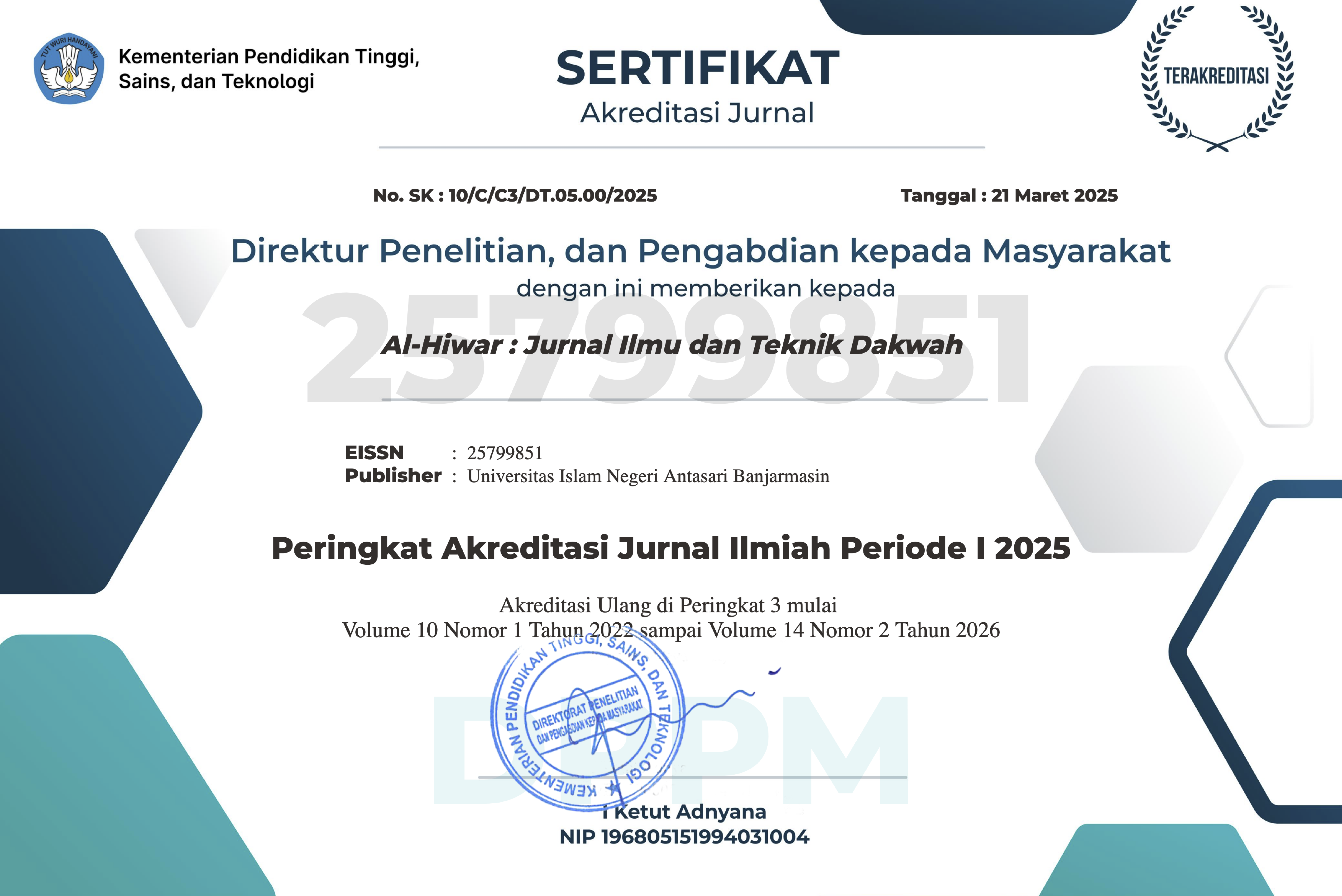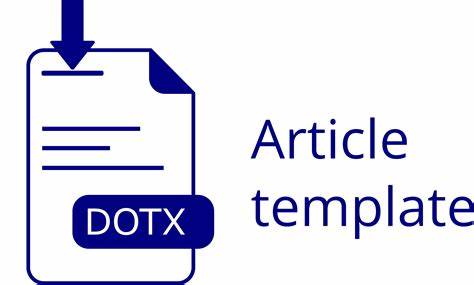Halal Sport Tourism: Study on Potential, Accessibility, and Management Models in Lombok, West Nusa Tenggara
DOI:
https://doi.org/10.18592/alhiwar.v13i1.15978Keywords:
accessibility, halal sport tourism, management model, potentialAbstract
The objectives of this research are: (1) To explore the potential and opportunities for Halal Sport Tourism in Lombok to bring in tourists. (2) mapping the fulfillment of facilities and infrastructure in making it easier for tourists to reach locations and activities at Halal Sport Tourism locations in Lombok. (3) Analyzing the participation of tourism actors (stakeholders) in the management of Halal Sport Tourism in Lombok. The method in this study uses a type of qualitative research using a descriptive approach. The results of this study show that the potential for Halal Sport Tourism in Lombok is actually quite large, this is shown by the existence of Sport Tourism Events, Active Sport Tourism, and some nostalgia for Sport Tourism in various places in Lombok. this is also strengthened by the existence of supporting infrastructure such as quite a lot of places of worship, Lombok is also predominantly Muslim so that halal guarantees in every sports tourism area can be ascertained to be halal. In terms of accessibility, accommodation already exists and this is good, this is indicated by the existence of several sharia hotels, then the ease of direct transportation to Muslim countries and regions, as well as guarantees of halal restaurants in the sports tourism area and easy access to purification and worship for tourists. The management model is an illustration of how the concept of Halal Sport Tourism can be developed. Currently, this special tourism interest has not been developed there. However, seeing the existing potential and access, Halal Sport Tourism has the potential to be developed further. Management of existing halal tourism and sports tourism can be integrated as a model for managing Halal Sport Tourism in the future.References
Adinda, Zachlul, Bevaola Kusumasari, Agus Heruanto Hadna, and Nurhadi Susanto. 2024. “Halal Tourism: A Critical Review of the Development and Implementation.” JKAP (Jurnal Kebijakan Dan Administrasi Publik) 28 (1): 1. https://doi.org/10.22146/jkap.90194.
Anwar, Khaerul. 2017. “Lombok Hijab Run Series Perkuat ”Branding” Destinasi Wisata Halal.” Kompas.Com. 2017. https://www.kompas.id/baca/nusantara/2017/12/10/lombok-hijab-run-series-perkuat-branding-destinasi-wisata-halal.
Arismunandar, Andi, Reiza D. Dienaputra, and Raden Muhammad Mulyadi. 2020. “Dari Pasanggrahan Hingga Grand Hotel: Akomodasi Penginapan Untuk Turis Pada Masa Hindia-Belanda Di Priangan (1869-1942).” Patanjala: Journal of Historical and Cultural Research 12 (2): 159. https://doi.org/10.30959/patanjala.v12i2.571.
Astuti, Marhanani Tri. 2018. “Strategi Pengembangan Wisata Bahari Di Gili Trawangan Kabupaten Lombok Barat Provinsi Nusa Tenggara Barat.” National Conference of Creative Industry 10 (September 2018): 5–6. https://doi.org/10.30813/ncci.v0i0.1202.
Asyari, Akhmad, Kadri Kadri, and Jumarim Jumarim. 2022. “Beragama Di Pulau Pariwisata Internasional : Pengalaman Toleransi Komunitas Muslim Di Lombok Nusa Tenggara Barat.” Manazhim. https://doi.org/10.36088/manazhim.v4i2.2021.
Bonang, Dahlia, Shofia Mauizotun Hasanah, M Nugroho, Syukriati Syukriati, Zulpawati Zulpawati, and Any Tsalasatul Fitriyah. 2022. “Geopark Rinjani, Sport Tourism, and the Rise of Local Participation Post COVID in Lombok, Indonesia.” Journal of Environmental Management and Tourism. https://doi.org/10.14505/jemt.v13.4(60).25.
Fahmi, Rizqi Anfanni. 2018. “Enhancing The Economic Role Of The Mosque Through Empowerment A Case Study in Yogyakarta City.”
Firdausi, I, S Marantika, Zein Nidaulhaq Firdaus, and Rifqah Sajidah. 2017. “Lombok : Halal Tourism as a New Indonesia Tourism Strategy.” https://doi.org/10.15242/heaig.h0317447.
Fitrianto, Fitrianto. 2019. “Pengembangan Ekonomi Indonesia Berbasis Wisata Halal.” Bisnis 7 (1): 69–80. http://journal.stainkudus.ac.id/index.php/bisnis/index.
Gammon, Sean, and Kurtzman Joseph. 2002. Sport Tourism: Principles and Practice. New York: Leisure Studies Association.
Hadi, Firdausia, and M. Khoirul Hadi Al-Asy Ari. 2017. “Kajian Potensi Dan Strategi Pengembangan Wisata Pantai Syari’ah (Studi Di Pulau Santen Kabupaten Banyuwangi).” Jurnal MD 3 (1): 99–116. https://doi.org/10.14421/jmd.2017.31-07.
Haerisma, Alvien Septian, Syamsul Anwar, and Aziz Muslim. 2023. “Development of Halal Tourism Destinations on Lombok Island in Six Features Perspective of Jasser Auda’s Maqasid Syari’ah.” Afkaruna: Indonesian Interdisciplinary Journal of Islamic Studies. https://doi.org/10.18196/afkaruna.v19i2.19437.
Hakim, Mustajab, Abdul Hakim, Nuddin Harahap, and Luchman Hakim. 2018. “Mandalika Tourism Specific Economic Zone, Lombok Tengah Regency, West Nusa Tenggara.” Journal of Business and Management (IOSR-JBM) 20 (10): 67–73. https://doi.org/10.9790/487X-2010046773.
Islami, Mona Erythrea Nur, Nuharani Erningdyah K., and Diah Enggarwati. 2019. “The Role of Mosque in The Development of Halal Tourism (Case Study in Masjid Gedhe Kauman, Yogyakarta) BT - Proceedings of the 1st International Conference One Belt, One Road, One Tourism (ICOBOROT 2018).” In , 140–44. Atlantis Press. https://doi.org/10.2991/icoborot-18.2019.35.
Kusumaningtyas, Menur, Cucu Hayati, and M. Hatta Fahamsyah. 2021. “Mengembalikan Image Pariwisata Lombok Paska Bencana.” Jurnal Pengembangan Wiraswasta 23 (1): 59. https://doi.org/10.33370/jpw.v23i1.558.
Lubis, Delima Sari, Paisal Rahmat, Ainun Nisa Brt, and Nurhikmah Aulia. 2023. “Halal Tourism: Potential and Prospects in Improving the Economy and Developing Mosque-Based Regional Tourism (Case Study of Nur Ala Nur Gread Mosque, Mandailing Natal).” Wealth: Journal of Islamic Banking and Finance 2 (2): 119–34. https://doi.org/10.24090/wealth.v2i2.9680.
Madnasir, and Anisa Binar Cahyani. 2024. “Analysis of Halal Tourism Development on Economic Development in Indonesia.” In KnE Social Sciences. Bandar Lampung: KnE Social Sciences. https://doi.org/10.18502/kss.v9i16.16288.
Malchrowicz-Mośko, E. 2021. “‘Can She Run or Scream While Travelling?’ Is Sports Tourism Halal or Haram? Management of Sports Travel of Muslim Women in the Era of West-East Dichotomy.” European research studies journal. https://doi.org/10.35808/ERSJ/1971.
Mandalika, Go. 2023. “Sports Tourism Di Mandalika: Pacu Adrenalin, Wisata Tak Terlupakan Di Lombok Tengah (Bagian 2).” 2023. https://gomandalika.com/sports-tourism-di-mandalika-pacu-adrenalin-wisata-tak-terlupakan-di-lombok-tengah-bagian-2/.
Mastercard & Crecentrating. 2019. “Global Muslim Travel Index 2018.” GMTI. 2019. https://www.crescentrating.com/reports/global-muslim-travel-index-2019.html.
Maulana, M. Reza Agista, Bagus Singandaru Adhitya, and Ihyana Hulfa. 2024. “Analysis of Potential and Development Strategies for Sama Guna Village as a Sport Tourism Village.” Journal of Finance, Economics and Business 3 (2): 142–64. https://doi.org/10.59827/jfeb.v3i2.180.
Nurjaya, Vip Paramarta, R. Roro Vemmi Kesuma Dewi, Kusworo, Surasni, Fika Rahmanita, Syafaatul Hidayati, and Denok Sunarsi. 2021. “Halal Tourism in Indonesia: Regional Regulation and Indonesian Ulama Council Perspective.” International Journal of Criminology and Sociology 10: 497–505. https://doi.org/10.6000/1929-4409.2021.10.58.
Nursyamsy, Muhammad. 2017. “Hotel Dan Restoran Di Lombok Kantongi Sertifikasi Halal.” Republika.Com. 2017. https://news.republika.co.id/berita/nasional/daerah/17/06/28/os916o-hotel-dan-restoran-di-lombok-kantongi-sertifikasi-halal?
Pamukcu, Huseyin, and Canan Tanrisever. 2021. “A New Favorite for Tourists: Halal Tourism in Future BT - Future of Tourism in Asia.” In , edited by Anukrati Sharma and Azizul Hassan, 267–77. Singapore: Springer Singapore. https://doi.org/10.1007/978-981-16-1669-3_16.
Pike, Steven. 2009. “Destination Brand Positions of a Competitive Set of Near-Home Destinations.” Tourism Management 30 (December): 857–66. https://doi.org/10.1016/j.tourman.2008.12.007.
Rachman, Abdul, Muizzudin, Arie Haura, and Aisyah Defy R. Simatupang. 2024. “Potential for Development of Mosque-Based Halal Tourism in Lombok, West Nusa Tenggara Province.” Journal of Islamic Economic and Business Research 4 (2): 176–89. https://doi.org/10.18196/jiebr.v4i2.319.
Rahmiati, Filda, Norfaridatul Akmaliah Othman, and Meilisa Audina Putri Sunanti. 2019. “Muslim Tourist Satisfaction of Halal Tourism in Lombok.” Jurnal Syarikah : Jurnal Ekonomi Islam 4 (2): 122. https://doi.org/10.30997/jsei.v4i2.1501.
Ratnasari, R. 2020. “Halal Tourism Based on Value Creation.” Al-Uqud : Journal of Islamic Economics 4: 268–84. https://doi.org/10.26740/al-uqud.v4n2.p268-284.
Sholehuddin, M. Sugeng, Munjin Munjin, and Hendri Hermawan Adinugraha. 2021. “Islamic Tradition and Religious Culture in Halal Tourism: Empirical Evidence from Indonesia.” IBDA` : Jurnal Kajian Islam Dan Budaya 19 (1): 79–100. https://doi.org/10.24090/ibda.v19i1.4470.
Supardin, Lalu, Mohammad Suyanto, Anas Hidayat, and Tony Wijaya. 2025. “A Bibliometric Analysis of Halal Tourism: Future Research Agenda.” Journal of Islamic Accounting and Business Research 16 (3): 566–84. https://doi.org/10.1108/JIABR-01-2023-0028.
Suryanto, and Poni Sukaesih Kurniati. 2020. “Tourism Development Strategy In Indonesia.” Academy of Strategic Management Journal 19 (6): 1–8.
Syihabudin, Muhammad, Abdullah Haidar, and Evania Herindar. 2022. “Konsep Model Sociopreneur Sudut Lombok Untuk Mendukung Pariwisata Halal Berkelanjutan Di Nusa Tenggara Barat.” Journal of Islamic Tourism Halal Food Islamic Traveling and Creative Economy 2 (2): 122–39. https://doi.org/10.21274/ar-rehla.v2i2.5904.
Taqwiem, Ahsani, and Farida Diyan Pertiwi. 2021. “Analysis of Halal Tourism Development in Lombok Island to Support The Economic Welfare of The Community.” Journal Research of Social, Science, Economics, and Management 1 (1): 1–7. https://doi.org/10.36418/jrssem.v1i1.5.
Taufiq Kurniawan, Baiq Ade Septa Iswarindi, Linda Rahmiwati, and Dávid Dénes Lóránt. 2023. “Shifting in Mindset of Local Community Towards MotoGP Race Event in Indonesia.” Jurnal Multidisiplin Madani 3 (3): 626–36. https://doi.org/10.55927/mudima.v3i3.3319.
Umuri, Khairil, Junia Farma, and Eka Nurlina. 2022. “Halal Tourism in Aceh: Opportunities and Challenges.” Al Mashaadir : Jurnal Ilmu Syariah. https://doi.org/10.52029/jis.v3i1.84.
Vargas-Sánchez, Alfonso, and María Moral-Moral. 2020. “Halal Tourism: Literature Review and Experts’ View.” Journal of Islamic Marketing 11 (3): 549–69. https://doi.org/10.1108/JIMA-04-2017-0039.
Winarti, Oktifani. 2017. “Halal Tourism in Indonesia: Does It Attract Only Muslim Tourists?” Jurnal Studi Komunikasi (Indonesian Journal of Communications Studies) 1 (3): 232–39. https://doi.org/10.25139/jsk.v1i3.139.
Yoshinta, D, Fendy Suhariadi, and S Wijoyo. 2024. “Integrating Human Resource Development and Halal Tourism Strategies for Sustainable Development in Indonesia.” Technium Social Sciences Journal 62: 195–204. https://doi.org/10.47577/tssj.v62i1.11718.
Yudiantoro, Deny, and Dedi Suselo. 2024. “Analysis of the Global Muslim Travel Index (Gmti) Approach As an Effort To Develop Halal Tourism in the Wilis Ring Area of Tulungagung Regency.” An-Nisbah: Jurnal Ekonomi Syariah 11 (1): 31–45. https://doi.org/10.21274/an.v11i1.8504.
Yusup, M, Riduan Mas’ud, and Maimunah Johari. 2022. “Brand Value and Tourists’ Satisfaction in Lombok Indonesia as a Halal Tourism Destination.” Shirkah: Journal of Economics and Business 1. https://doi.org/10.22515/shirkah.v7i1.403.
Zarkasyi, Muhammad Ridlo, Dhika Amalia Kurniawan, and Fajar Surya Ari Anggara. 2022. “Stakeholders Approach in Halal Tourism Development Strategy: A Case Study in Ponorogo District.” Ekuilibrium : Jurnal Ilmiah Bidang Ilmu Ekonomi 17 (2): 171–81. https://doi.org/10.24269/ekuilibrium.v17i2.2022.pp171-181.
Zitri, Ilham, Artim Gushadi, Amil, Darmansyah, and Azwar Subandi. 2023. “Pariwisata Halal Di Nusa Tenggara Barat: Implementasi Dalam Kawasan Ekonomi Khusus Mandalika.” Journal of Social and Policy Issues 3: 113–20. https://doi.org/10.58835/jspi.v3i3.107.
Downloads
Published
How to Cite
Issue
Section
License
Copyright (c) 2025 Hikmah Endraswati, Munif Solihan, Shofi'unnafi Shofi'unnafi, Dahlia Bonang, Bayu Mitra A. Kusuma

This work is licensed under a Creative Commons Attribution 4.0 International License.
Authors who publish with this journal agree to the following terms:
- Authors retain copyright and grant the journal right of first publication with the work simultaneously licensed under a Creative Commons Attribution License that allows others to share the work with an acknowledgement of the work's authorship and initial publication in this journal.
- Authors are able to enter into separate, additional contractual arrangements for the non-exclusive distribution of the journal's published version of the work (e.g., post it to an institutional repository or publish it in a book), with an acknowledgement of its initial publication in this journal.
- Authors are permitted and encouraged to post their work online (e.g., in institutional repositories or on their website) prior to and during the submission process, as it can lead to productive exchanges, as well as earlier and greater citation of published work.






